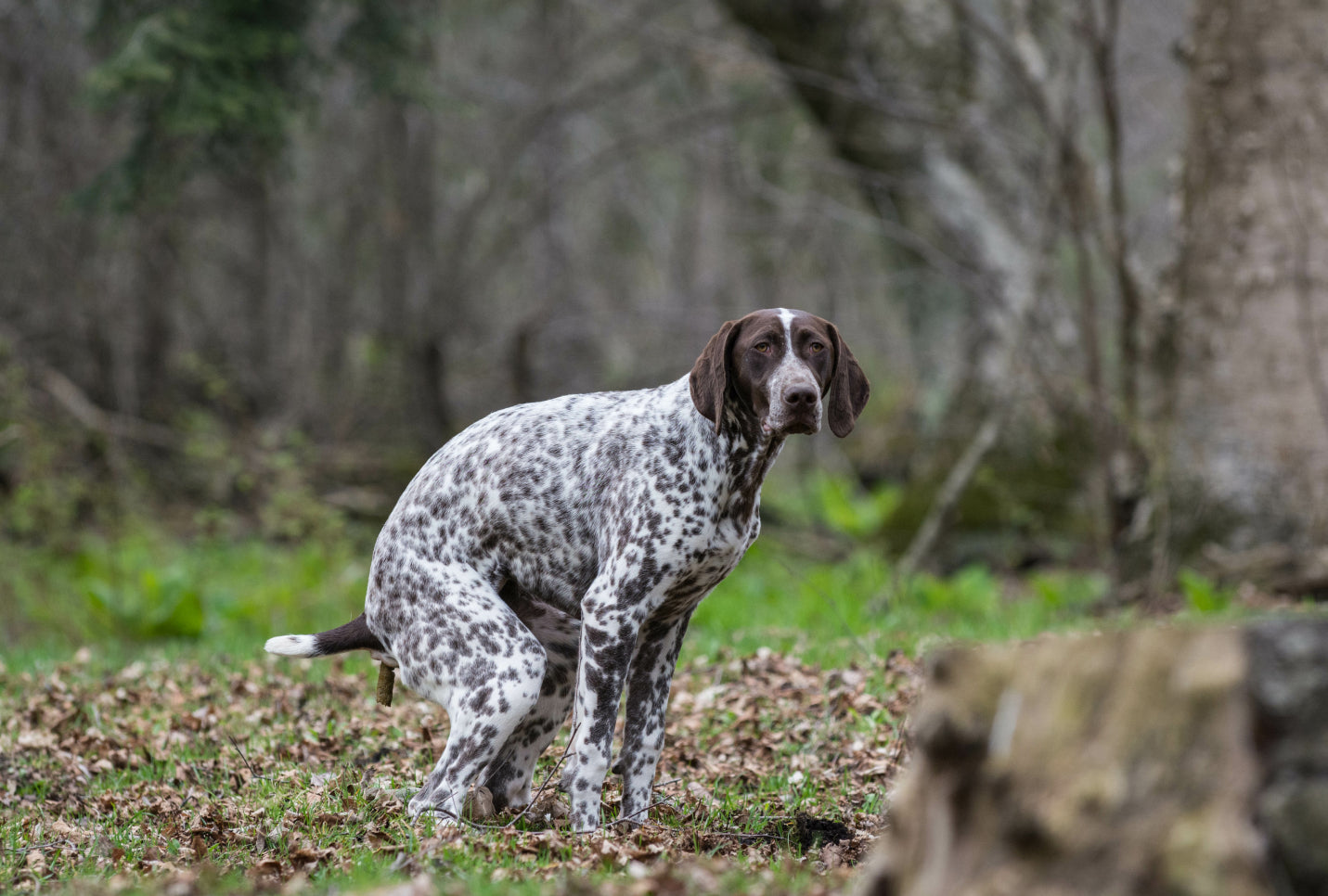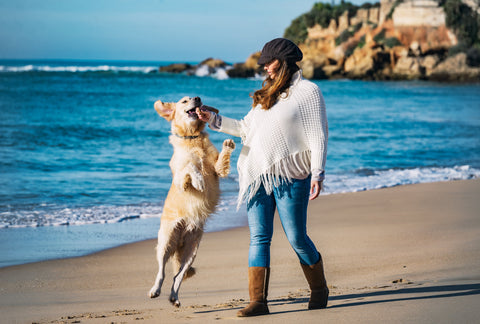
How Many Times a Day Should a Dog Poop?
When it comes to our furry friends, we understand that going number two is a natural bodily function. Yet, have you ever considered how frequently your dog should be doing it? This vital aspect of pet care is often overlooked, but understanding your pup's elimination habits is crucial for their overall health and well-being.
In this article, we'll uncover the various factors that affect dog bowel movements and go over some helpful tips for encouraging proper elimination habits. So, if you're curious about your canine companion's ideal pooping frequency, keep reading.
How Do Dog Digestive Systems Work?
To comprehend how often a dog should poop, it's essential to understand their digestive system.
A dog's digestive system is a complex machine responsible for breaking down proteins, fats, and carbohydrates into vital energy sources. As food passes through the gastrointestinal tract, your pup's body absorbs valuable nutrients while eliminating waste material. After this process is completed, fecal matter (or poop) is expelled from the body.
The amount of time it takes for food to pass through the digestive system varies depending on several factors, including breed, diet, and age. On average, food takes anywhere from eight to 16 hours to pass through a dog's body. When it comes to pooping habits, your pup should be excreting waste material at least once a day — if not more.
What Factors Influence Dog Pooping Frequency?
Now that you understand the basics of a dog's digestive system, let's explore some of the factors that can influence their pooping frequency:
Age
Age plays a significant role in a dog's pooping frequency. With their faster metabolism and smaller digestive systems, puppies tend to eliminate waste more frequently.
Their digestive systems become more efficient as they mature, and their pooping frequency generally decreases. However, it's important to note that age-related changes, such as senior dogs experiencing slower digestion, can also impact pooping frequency.
Diet
The type and quality of food your dog consumes directly influences their digestive system and pooping habits. A well-balanced diet that meets your pup's nutritional needs, including adequate fiber content, promotes regular bowel movements.
High-quality dog foods — such as A Pup Above — are formulated to provide essential nutrients and support healthy digestion. If you're unsure about your dog's dietary needs, consult your veterinarian for personalized recommendations.
Exercise
Regular exercise keeps your dog physically fit and affects their digestion and pooping frequency. This is because physical activity stimulates the muscles in the gastrointestinal tract, aiding in healthy digestion and regular elimination.
Dogs that lead sedentary lifestyles may experience slower digestion, leading to irregular or infrequent bowel movements. Ensure your dog gets enough exercise based on their breed, age, and overall health to support their digestive health.
Health Conditions
Finally, certain health conditions can also influence a dog's pooping frequency. Digestive disorders, food allergies, intestinal parasites, and underlying medical issues may cause changes in frequency, consistency, or difficulty in eliminating waste.
How Can I Get My Dog To Poop?
If your dog isn't pooping regularly or if you notice any changes in their pooping habits, it's important to take action. Of course, it's not uncommon for dogs to experience occasional constipation, but prolonged periods without pooping or difficulty eliminating waste can cause concern.
Here are some steps you can take if your dog isn't pooping:
Increase Fiber Intake
Dietary fiber helps add bulk to stool and promotes regular bowel movements. You can incorporate high-fiber foods into your dog's diet, such as pumpkin puree (plain, canned), or consider switching to a high-quality dog food formula with higher fiber content. Not sure where to find one? Check out A Pup Above!
Made with 100% human-grade ingredients and absolutely nothing artificial, our fresh dog food is made with fiber-rich veggies and nourishing bone broth to support optimal digestion and regular elimination.
Simply feed A Pup Above to your pup according to the feeding guide and rest easy, knowing their digestive health is in good hands.
Get Moving With Regular Exercise
As touched on previously, regular exercise supports healthy digestion. Take your canine companion for a stroll around the park, or let them run and play in the yard. This helps move food through their digestive tract, reducing stress levels and improving overall well-being.
Ensure Proper Hydration
Adequate water intake is vital for healthy digestion and smooth bowel movements. Make sure your four-legged pal always has access to fresh and clean water. Encourage them to drink regularly, especially during warmer weather or after exercise.
Pro Tip: If your pup isn't drinking enough H2O, add a few ice cubes to the bowl or mix in some low-sodium chicken broth for extra flavor.
Offer a Belly Massage
Give your pup a gentle belly rub to help alleviate constipation. Start by placing your hand on their abdomen and use gentle, circular motions in a clockwise direction.
This can help stimulate the digestive system and encourage the movement of waste through the intestines. Plus, who doesn't love a good belly rub?
Consult Your Vet
If your dog's constipation persists, it's time to call in the professionals. A veterinarian is the best person to assess your dog's overall health and provide expert advice. They may recommend a stool softener, prescribe medication, or suggest further tests if necessary.
What Do I Do If My Dog Is Pooping Too Much?
On the flip side, if your dog is pooping too much, it can also be a cause for concern. While some dogs naturally have more frequent bowel movements, excessive pooping can indicate underlying issues.
Here are a few tips to consider if your dog is pooping in excess:
Review Their Diet
Take a closer look at your pup's diet and assess if any recent changes may contribute to the increased frequency of bowel movements. Certain foods or treats may not agree with their digestive system, leading to more frequent pooping.
Note: If necessary, consult your veterinarian to determine if a diet adjustment is needed.
Monitor for Diarrhea
Excessive pooping can sometimes be accompanied by diarrhea. Keep an eye on the consistency of your dog's stool.
It may indicate an underlying gastrointestinal issue if it's consistently loose or watery. Contact your pup's vet for guidance on how to manage and treat diarrhea.
Check for Parasites
Parasites such as worms can disrupt your dog's digestive system and cause increased bowel movements. Regularly deworm your canine companion as recommended by your veterinarian to prevent and manage parasitic infections.
If you suspect parasites are the cause of excessive pooping, seek veterinary assistance for appropriate treatment.
Assess Stress Levels
Believe it or not, stress can greatly affect your dog's digestive system, leading to increased bowel movements. Evaluate your pup's environment and daily routine for potential stressors.
If necessary, implement measures to reduce stress, such as providing a calm and comfortable space, using anxiety-reducing techniques, or seeking professional help if needed.
Consult Your Veterinarian
If your dog's excessive pooping persists or is accompanied by other concerning symptoms like weight loss, lethargy, or vomiting, it's crucial to consult with your veterinarian. They can conduct a thorough examination, perform necessary tests, and provide appropriate treatment options based on their findings.
A Final Word
So how many times a day should a dog poop, you ask?
Although it can vary, the general guideline is that a dog should poop at least once a day. However, it's not unusual for dogs to poop a few times a day — especially if they have a larger appetite or are fed multiple smaller meals throughout the day.
Remember, every dog is unique, and their pooping frequency can vary. Establishing a baseline of what is normal for your dog and monitoring for any changes is important.
Trust your instincts as a pet owner, and don't hesitate to seek professional guidance when needed. Your dog's health and well-being are worth it!
Here at A Pup Above, we take your pup's digestive health seriously. That's why our fresh dog food recipes are made with wholesome, human-grade ingredients like fiber-rich veggies and nourishing bone broth. So if you want to give your pup the best nutrition for a happy and healthy gut, check us out today — trust us; your pup will be glad you did.
Sources:
Digestive System of the Dog | Veterinary Teaching Hospital | Washington State University
Puppy Diarrhea - Causes, Treatment & Symptoms | AKC
Worms in Dogs: Prevent, Diagnose, and Treat Different Types of Worms | AKC
Top Stories

Why Do Dogs Lick Their Paws?

Why Do Dogs Whimper & Make Noises in Their Sleep?

Healthy Vet-Approved Homemade Dog Food Recipes

How To Cook Sweet Potatoes for Dogs






















